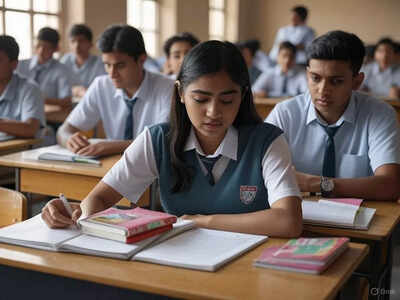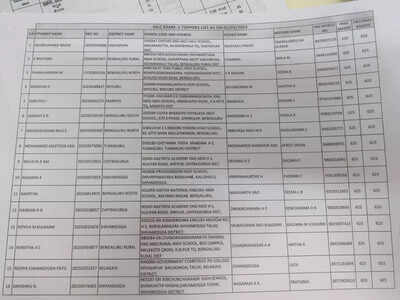Voices From The Top: Dual Board Exam Plan Risks More Harm Than Good

India’s education landscape is undergoing a significant transformation as multiple boards prepare to implement a dual-board exam system for Class 10 students starting in the 2025–26 academic year. The Central Board of Secondary Education (CBSE) has announced a pilot program for this initiative, with full-scale implementation slated for February 2026. Similarly, the Council for the Indian School Certificate Examinations (CISCE), responsible for the ICSE exams, is aligning its plans to adopt this format.
State education boards are also actively preparing for this shift. The Maharashtra State Board of Secondary and Higher Secondary Education (MSBSHSE), Tamil Nadu’s Directorate of Government Examinations (TNDGE), and the Karnataka Secondary Education Examination Board (KSEEB) are moving forward with preparations. Meanwhile, the Jharkhand Academic Council (JAC) and the Punjab School Education Board (PSEB) are evaluating the proposal and may implement it soon.
Under the forthcoming dual board exam system, traditional supplementary examinations—previously offered to students failing in one or more subjects—will be discontinued. Instead, students will have the opportunity to retake the board exams within the same academic year, either in February or April/May. The best score will be considered final. This approach provides a second chance to improve scores without the stigma associated with supplementary exams.
While the proposed dual board exam system is intended to offer flexibility and align with the NEP’s vision of second chances, several school leaders argue that its real-world execution may do more harm than good. School leaders caution that it could double student stress, strain teachers with prolonged evaluation duties, and shrink meaningful teaching days due to overlapping exam schedules.
Two boards, double the chaos
Sudha Acharya, Principal of ITL Public School, Dwarka, has warned that the proposed two-board exam system will have “serious repercussions” on the smooth functioning of schools.
She pointed out that even with one board exam, teachers remain preoccupied with non-teaching duties for nearly four months. “From January to April, they are engaged as external examiners, centre superintendents, question paper analysts, marking scheme preparers, and finally evaluators,” she said. “Now imagine this happening twice a year. Learning days in school will be heavily compromised.”
Acharya also flagged the impact on student well-being. “Two exams in quick succession will increase mental stress,” she said. “And students might become complacent, knowing they will get another chance to appear in all five subjects if they don’t clear the first attempt.”
“If the second exam is held in May, the entire cycle starts again—and evaluation will go on in June,” she added.
A cosmetic fix
Dr. Ameeta Mulla Wattal, Chairperson and Executive Director – Education, Innovations, and Training, DLF Foundation Schools and Scholarship Programs, has said that the proposed double board exam in Class 10 could lead to a significant restructuring of academic planning, assessment, and pedagogy.
“The double board examination will fundamentally shift how we approach teaching, learning and testing,” she said, warning that its impact must be evaluated in the broader context of 21st-century education.
She acknowledged that, in theory, the new system might reduce exam-related anxiety by offering students a second attempt. “It may encourage a growth mindset and promote flexibility. Second chances supposedly align with the NEP vision of formative competencies and empower students to take ownership of their learning,” she said. “This may gradually bridge the road to the skill gap, pushing children towards understanding rather than rote.”
However, she added that the approach had significant downsides.
“In reality, the burden on teachers remains immense, and the curriculum reform is stagnant,” she noted. “There is no reduction in syllabus or teaching hours. The curriculum hasn’t been restructured.”
She argued that without meaningful reform in content or testing methods, the system risks reinforcing outdated norms. “Students are resitting exams based on outdated knowledge and an outdated assessment pattern. Unless the design is changed—making it analytical—this is just another round of testing,” she said.
Dr. Wattal also flagged the added pressure of evaluation cycles. “Double corrections of the pre-boards and the board exams will fuel more coaching,” she said. “In our country, every examination leads to remedial classrooms and tuitions.”
She warned that the reform could deepen the education divide. “Well-resourced schools can provide targeted coaching for both rounds. But government schools, with fewer teachers and more children, may struggle to support even one round effectively,” she said.
Highlighting the emotional fallout, she said the extended exam calendar could severely affect mental well-being. “There will be a huge trade-off in mental health by prolonging the examinations, creating stress and anxiety in all stakeholders,” she cautioned.
She concluded with a sharp note of caution: “The idea makes partial sense only if it’s part of a larger systemic shift—one that includes curriculum reform, thematic skill-based modules, reduced teacher load, and a move towards testing thinking over memory. Without all this, it risks being just a cosmetic fix that doesn’t solve the deeper problem of irrelevant content, overburdened teachers, and a skill mismatch in education.”
Shortened learning time and strain on teachers
Aasha Prabhakar, Principal of Bal Bharati Public School, NOIDA, has also expressed concerns over the proposal to conduct two board exams per academic year, highlighting its potential impact on students, teachers, and academic delivery.
“During my conversation with a CBSE official, it was claimed that 65% of principals across India supported the idea,” she said. “However, discussions with fellow principals reflected a different sentiment—none of us were in favour of this proposal.”
She pointed out that the dual board format could pose several challenges. “It would increase stress on students and require teachers to be redeployed for exam-related duties, which would affect regular classroom teaching.”
Prabhakar explained that each board exam cycle takes nearly 52 days. “With two exams, that totals 104 days—leaving limited time out of the approximately 180 teaching days available. When you factor in weather disruptions and other non-instructional events, achieving learning outcomes becomes difficult.”
She called for a careful reconsideration of the move. “Any educational reform must place student well-being and quality learning at the centre.”
She also underscored the need to focus on teachers’ mental health. “Two board exams would bring additional stress, anxiety, and burnout as teachers juggle syllabus completion and evaluation duties,” she said. “We risk pushing committed educators out of the profession if their well-being is continually overlooked.”
No summer vacation for teachers?
Rupa Chakravarty, Director of Suncity World School, has flagged important logistical concerns around the proposed two-board exam format, particularly regarding teachers’ schedules and student preparedness for competitive exams. “I’d like to highlight two points that need attention,” she said. “One is about teachers’ vacation, which typically begins at the end of May or early June,” she noted. “Will they be expected to continue with checking and tabulation even after schools close for the summer?”





